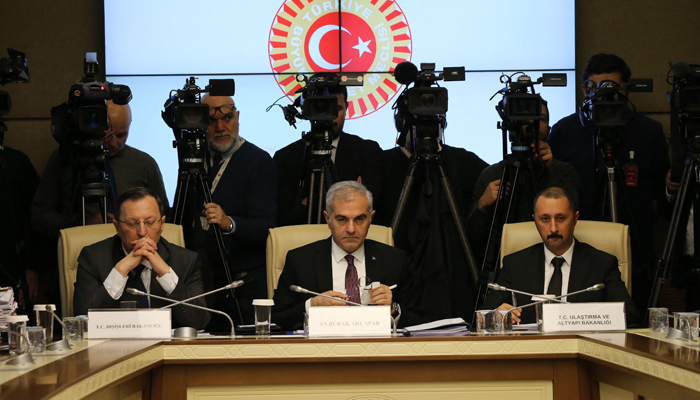Turkey parliament committee approves Sweden’s NATO bid
ISTANBUL: A key committee in the Turkish parliament on Tuesday approved Sweden’s bid to join NATO after months of delays, clearing another hurdle in the Nordic country’s accession process in the wake of Russia’s invasion of Ukraine last year.
Sweden’s NATO bid had been stalled amid opposition from Turkey and Hungary and recently it was further complicated after President Recep Tayyip Erdogan linked it to Ankara’s request for F-16 fighter jets from its ally the United States.
Sweden and Finland dropped decades of military non-alignment and sought to join the US-led defence organisation after Russia invaded Ukraine in February 2022.
Their bids won fast-track approval from all NATO members except Turkey and Hungary. The two ultimately relented and Finland was accepted as NATO’s 31st member in April.
Turkey and Hungary remain the only North Atlantic Treaty Organization members left to ratify Sweden’s bid 19 months after it applied for membership.
On Tuesday, the Turkish parliament’s foreign affairs committee approved the measure.
“The protocol (on Sweden’s NATO accession) passed the committee,” opposition CHP party lawmaker Utku Cakirozer, a member of the foreign affairs committee, told AFP after the vote. The move paves the way to a vote by the full parliament, where Erdogan’s ruling alliance holds the majority of seats. It was no immediately clear when the full parliament would hold its vote.
Erdogan in July lifted his objections to Sweden’s NATO membership after Stockholm cracked down on Kurdish groups that Ankara calls terrorists.
NATO allies have piled pressure on Turkey, with France saying the credibility of the alliance was “at stake”.
In December, Erdogan had linked Sweden’s membership to the US Congress “simultaneously” agreeing to sell F-16 fighter jets to Turkey. He also said NATO allies including Canada should lift arms embargoes imposed on Ankara.
“Sweden’s NATO membership and F-16 sales to Turkey will be handled in coordination to some extent... because unfortunately, neither country trusts the other,” Ozgur Unluhisarcikli, the Ankara office director of the US German Marshall Fund think tank, told AFP.
Turkey’s ageing air force has suffered from Ankara’s expulsion from the US-led F-35 joint strike fighter programme in 2019.
This was in retaliation for Erdogan’s decision to acquire an advanced Russian missile defence system that NATO views as an operational security threat.
-
 UK Asylum System Faces Changes As Refugees Will Get Temporary Protection Only
UK Asylum System Faces Changes As Refugees Will Get Temporary Protection Only -
 Meghan Markle Has Realised ‘star Power’ Is Not Enough After Jordan Trip
Meghan Markle Has Realised ‘star Power’ Is Not Enough After Jordan Trip -
 USC Leading Scorer Chad Baker-Mazara Leaves Program Amid Losing Streak
USC Leading Scorer Chad Baker-Mazara Leaves Program Amid Losing Streak -
 Google Is Winding Down Popular App 'Pixel Studio': Here's Why
Google Is Winding Down Popular App 'Pixel Studio': Here's Why -
 Zendaya, Tom Holland Secretly Married?
Zendaya, Tom Holland Secretly Married? -
 Dove Cameron Reveals Why She's Limiting Relationship Talk After Damiano David Engagement
Dove Cameron Reveals Why She's Limiting Relationship Talk After Damiano David Engagement -
 Bulls Vs Bucks: Giannis Out, Simons And Williams Sidelined
Bulls Vs Bucks: Giannis Out, Simons And Williams Sidelined -
 Princess Beatrice Is ‘haunted’ By Dreadful Shamed Andrew Arrest
Princess Beatrice Is ‘haunted’ By Dreadful Shamed Andrew Arrest -
 Panthers Vs Islanders: Dmitry Kulikov Returns From Injured Reserve As Schwindt Hits IR
Panthers Vs Islanders: Dmitry Kulikov Returns From Injured Reserve As Schwindt Hits IR -
 SAG-AFTRA Drops SAG Awards Name To Rebrand
SAG-AFTRA Drops SAG Awards Name To Rebrand -
 Next Full Moon: How To Watch The Total Lunar Eclipse On March 3
Next Full Moon: How To Watch The Total Lunar Eclipse On March 3 -
 Bhad Bhabie Shares Tender Moment With Daughter Amid Cancer Setback Hint
Bhad Bhabie Shares Tender Moment With Daughter Amid Cancer Setback Hint -
 Silver, Gold Prices Surge Amid Geopolitical Uncertainty After US-Israel Attack On Iran
Silver, Gold Prices Surge Amid Geopolitical Uncertainty After US-Israel Attack On Iran -
 Britain To Trial Social Media Ban For Hundreds Of Thousands Of Children Under-16
Britain To Trial Social Media Ban For Hundreds Of Thousands Of Children Under-16 -
 Prince Harry Should Face Same Fate As Shamed Andrew, Says Expert
Prince Harry Should Face Same Fate As Shamed Andrew, Says Expert -
 Oil Price Jumps, Stocks Fall After US And Israel Strike Iran
Oil Price Jumps, Stocks Fall After US And Israel Strike Iran




